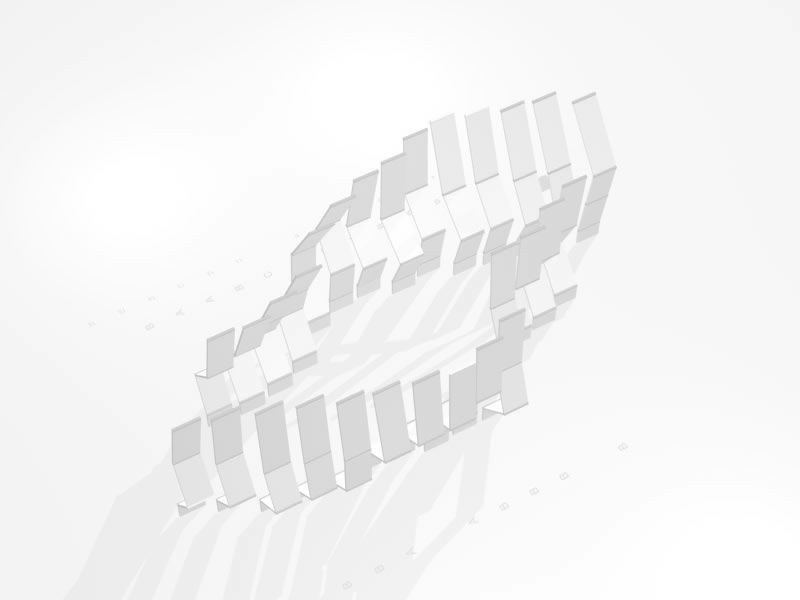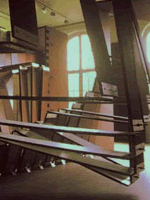 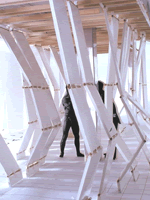 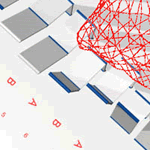 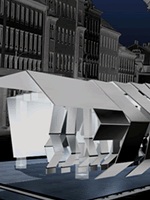 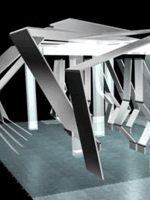 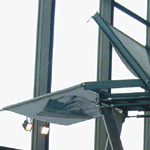 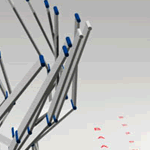 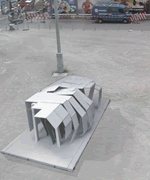 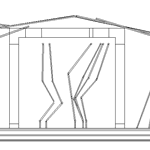 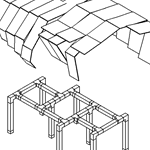 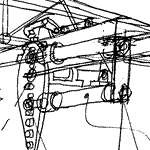 |
//BackprojectionBACK PROJECTION I, moveable paper installationBiannual Exhibition PAPER ART 7 in Dueren, Germany BACK PROJECTION II, animated Prototype (aluminium panels, pneumatic muscels) developed with FESTO for ARS ELECTRONICA Festival 2001 in Linz, Austria www.aec.at/gummibear //About „BACK PROJECTION I + II are understood as an architectural projects aimed at producing a conscious experience of our current concept of space by materializing the media-induced expansion of spatial dimensions relating to time and virtual space. Our concept of spatial limits, our perception of spatial continuity and discontinuity is undergoing profound changes. An inseparable link is forming between the concrete, physical space and other, parallel dimensions of space which can be experienced on a virtual level. A prototype for BACK PROJECTION was presented at the Ars Electronica Festival 2001 "Take over". It comprises two moveable oblong panels powered by a pneumatic motor and controlled via a feedback system consisting of a game interface on the Internet. ESCAPE*spHERE refers to the project's overall configuration as a the new space incorporating technology and media “ //Description BACK PROJEKTION II represents a project intended for an urban, public setting. It seeks to function as a potential intersection of physical and virtual space. In this installation, concrete, real space is expanded by abstract dimensions from the Internet. These produce a greater distance between space and viewer, and thus a different, expanded experience and understanding of space. Conversely, aspects of physical existence such as transience and proportionality are applied to virtual space. In the context of this installation, real space that can be physically experienced is to be considered as a movable negative impression of an invisible body. This body, a bear-shaped jellybean (Gummibaer), exists only virtually. Its position in space and its physical dimensions are, on one hand, determined by directly touching movable elements in the concrete, physical installation. On the other hand, they are being continually changed by the interventions of those accessing the installation’s website (www.aec.at/gummibaer). The Gummibaer stands metaphorically for an initially not totally comprehensible system of spatial influences. They enable users in both domains, in both realities (RR/VR), to playfully encounter the possibilities of spatial modification and communication. Space becomes soft, individually adjustable, and at the same time generates a collective realm of action. //The Physical Construct The physical installation consists of structural elements that are movable and exist in a certain relationship of interdependence. They are in a position both to respond to concrete demands like sitting, leaning and forming niches, as well as to create synchronized shapes on a much larger scale like a continuously connected skin. By sliding the panels, the real space, the silhouette of the Gummibaer, can be modified. //The Virtual Construct The website offers the possibility of playing a game and thereby influencing the installation’s variable space configuration. The centerpoint of the game is a construct that can be accessed and freely shaped in this weightless environment without clearly defined boundaries. If this results in a constellation that the player finds interesting, he/she can transmit this information to the server to be applied to the physical construct as form-determining parameters. The Gummibaer, the shape of which is enclosed by the installation’s movable elements (correspondence via externally applied formal reduction), is represented in virtual space in a different way: it is depicted as a sort of skeleton consisting of individual points that describe its form. These points can be touched directly; the elements connecting them are elastic and are not designed to be touched. //Constructive Interfaces The virtual space of the website is directly linked to the real space in Linz. The nexus of the two constitutes a configurable installation that displays both virtual and real dimensions of space and thus forms the interface between the physical site and the website. Set amidst an urban context, the installation creates a space that is experienced as variable. The superimposition of a temporary installation upon a concrete physical location is further expanded by the installation’s virtual elements. Once a user has checked in at the website, the game proceeds in accordance with conditions prevailing in the concrete space: if one person is present there (or if several are), then this has an impact upon the activation of various parameters such as gravity, springiness, and immanent impulse (life) for the player—he/she then has the power to make these forces stronger or weaker. In return, spatial parameters (such as spatial orientation) that cannot be ignored by the player suddenly become relevant for the virtual construct. The concrete space undergoes changes via atmospheric interventions from the Internet (light / sound / synchronized movement of the panels). It evokes the presence from “off-screen” in the form of a large-format projection of a Web address (www.aec.at/gummibaer), as well as through the sequence of movements specified from afar. The abstract space is activated via the ever changing presence of visitors in the concrete space (sounds/ hearing footsteps). A breath of life is blown into the Gumibaer-correspondence. In this way, spatial influences are thematized that are independent of the structures that have been erected. Space, as we experience it, is not fixed; it is soft and expandable. From a distance, others participate in this and exert what is for us a lasting influence upon it — just as how we deal with spaces leaves behind traces in other spaces without us being aware of it. //The Prototype The walk-through prototype demonstrates two of the planned 24 movable elements. It presents various possibilities of interaction either via monitor or through direct touch by visitors. Projections make available process-related supporting documentation, designs/blueprints, and current state-of-the-project information. For the RÜCKPROJ EKTION Project, the Ars Electronica FutureLab as a collaborating associate of ESCAPE*spHERE, developed a multi-user platform as well as the concept for the virtual dimension of the project. //Credits: Maschinenbau: Dipl. Ing. Thomas Koch Gesponsert von: .KUNST Bundeskanzleramt/ Firma Festo/ Werkraum Wien/ Institut für Fördertechnik, Technische Universität Wien/ Dipl.Ing. Thomas Koch |

